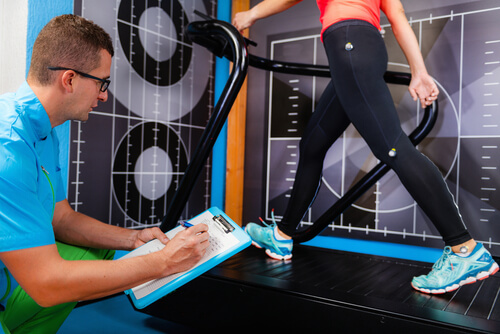
Related Resource: How Much Do Kinesiologists Make?
About the Study of Biomechanics
Classified as both a basic and applied science, biomechanics integrates the laws of physics with the working concepts of engineering to describe the internal and external forces acting on the body as well as the effects created with these forces. Although biomechanics is more focused on the mechanical principles of body systems, there are many times when physiological functions and biochemical tissues are taking into consideration when discussing motion. Studies in biomechanics often will address a broad range of topics, including the mechanical function of:
- muscles
- connective tissues
- cartilage
- skin
- nerves
- joints
- bones
- internal organs
Biomechanics is an increasingly important area of scientific study for addressing problems related to human health and performance. Biomechanics research is often applied by:
- physical education teachers
- physical therapists
- physicians
- personal trainers
- coaches
Types of Careers in Biomechanics
Biomechanists are highly trained scientists that can find employment in various different fields of application including:
- biology
- exercise science
- sports science
- health sciences
- athletic training
- ergonomics
- biomechanical engineering
- human factors psychology
- mechanical engineering
- biomedical engineering
Most professionals in the biomechanics careers field are involved working in laboratories to conduct essential biomechanics kinesiology studies on:
- locomotion patterns
- osteoporosis
- mobility impairment
- microgravity
- transitional changes
- injury reduction
- sport performance
- occupational health
Therefore, biomechanists can be found:
- working in gait analysis research labs
- creating designs in sports companies
- completing work related to flexibility testing
- analyzing sports performance
- designing man-machine interfaces
- studying human movement
- testing athletes
- practicing lab techniques
- researching in a biomechanics laboratory
Individuals can learn more about specific biomechanics jobs available by becoming a member of the American Society of Biomechanics and networking with other biomechanists.
How to Prepare for a Job in Biomechanics
To begin on the academic journey towards becoming a biomechanist, it is recommended that undergraduate students interested in obtaining a bachelor’s degree in kinesiology, exercise science, or a sports biomechanics degree to take introductory courses related to:
- physics
- human anatomy
- physiology
- functional anatomy
- engineering
- exercise science
Gaining more specialized experience will require you to pursue a graduate degree at one of the over 85 universities in North America that offer a biomechanics emphasis in an advanced biomechanics program. Earning a master’s degree will provide the background needed to work as junior researchers or laboratory technicians in biomechanics. The majority of biomechanists decide to pursue a doctoral degree to unlock more senior responsibilities in biomechanical research.
Conclusion
Now that you can answer the question, “What is biomechanics,” you can decide if pursuing a degree in the field is right for you. You may be ready to study biomechanics and kinesiology to prepare for sports biomechanics jobs.
Related Resources:
- 10 Most Affordable Bachelor’s Exercise Science Degree Online Programs
- What is a Sports Massage Therapist?
- What is an Exercise Physiologist?
- What Does A Sports Nutritionist Do?
- How Do You Become a Physical Therapist?
- What Sports Medicine Classes Do I Need to Take to Get a Job in Sports Medicine?
- Sports Nutritionist